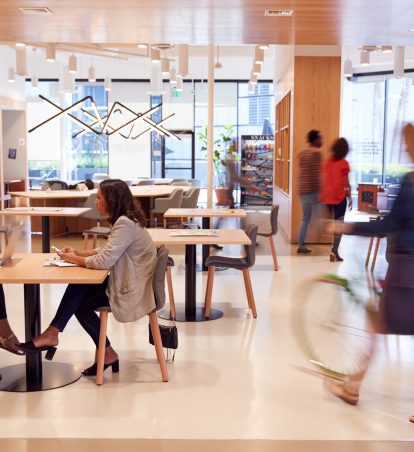Global Sustainability Trends Shaping Corporate Housing for Business Travel
As the global business travel landscape shifts toward a more sustainable future, the role of corporate housing providers has never been more vital. Around the world, environmental policies are tightening, ESG (Environmental, Social, and Governance) expectations are rising, and companies are reevaluating their travel programs to ensure they align with evolving standards. Across continents and industries, organizations are under pressure to meet evolving environmental regulations and align with prioritized ESG goals. This global shift is prompting a reevaluation of how companies house their mobile workforces—sparking innovation, accountability, and opportunity in the corporate housing sector.
At Synergy, we see these changes not as challenges—but as an opportunity to lead. We believe sustainable business travel begins with smart, flexible accommodations from achieving a Silver EcoVadis rating to pioneering industry-first sustainability tools, we’re committed to building a more resilient, transparent, and eco-conscious future for business travel accommodations.
Let’s explore how global regulations and emerging trends are redefining the future of corporate housing—and why it matters now more than ever.
The Role of Sustainability in Corporate Housing

Sustainable corporate housing refers to furnished apartments and serviced accommodations designed and operated with a minimal environmental footprint. This includes properties that utilize green building practices, energy-efficient systems, waste reduction programs, and responsible water use—creating a more conscious, lower-impact stay for today’s global traveler.
But sustainability in our industry isn’t just about green buildings. It’s about changing the way we measure success. As Adam Braun, cofounder and CEO of Clarasight, noted during a recent GBTA panel, “Sustainability is becoming a decision-making factor for finance teams, procurement leaders, and ESG officers alike.” In other words, the green credentials of your housing program could soon influence whether or not your company wins the next big contract.
For providers like Synergy, sustainability isn’t just an environmental effort—it’s a business imperative. For our partners and clients, sustainable corporate housing offers both a values alignment and a practical advantage. By choosing housing providers that prioritize sustainability, companies not only reduce emissions but also streamline compliance with internal ESG policies and external regulations.
At Synergy, this thinking underpins our entire approach. In 2024, we solidified our commitment to long-term impact by setting an ambitious Carbon Net Zero target by 2045—a goal grounded in transparency and validated through our reapplication to the Science Based Targets initiative (SBTi). Our GreenFeet partnership helps us track emissions annually, with our 2024 report showing a 4% reduction in emissions year over year—a tangible step forward on the path to Net Zero.
By investing in sustainable housing options and innovations like SynergySMART, our proprietary digital inspectio platform, we’re creating end-to-end processes that reduce waste, track ESG metrics, and support clients in meeting their own Scope 3 sustainability goals.
Regional Sustainability Trends Impacting Corporate Housing
The European Union
In Europe, sustainability regulations are no longer suggestions—they’re requirements. Regulatory frameworks like the EU Taxonomy and the Sustainable Finance Disclosure Regulation (SFDR) are reshaping corporate decision-making. Providers of corporate housing in Switzerland, Germany, and the UK now face increased scrutiny to meet green building standards and disclose their sustainability efforts. Forcing them to adapt quickly to meet the rising demand for furnished apartments that meet these rigorous energy efficiency and carbon neutrality standards.
This has prompted a shift toward environmentally responsible properties, many of which now feature energy-efficient HVAC systems, LEED or BREEAM certifications, and low-emission construction materials. For global companies housing their teams across the continent, partnering with providers that meet these criteria isn’t just preferred—it’s essential.
Synergy’s commitment to meeting these expectations is evident in projects like Synergy @ Coopers Cross in Dublin—a development that leverages AI-enabled building systems, rainwater harvesting, and full electrification (no gas) to optimize sustainability across every touchpoint. These apartments demonstrate what’s possible when environmental responsibility and traveler comfort go hand in hand.
Middle East
With bold initiatives such as Saudi Arabia’s Vision 2030 and the UAE’s commitment to net-zero emissions by 2050, the Middle East is becoming a surprising leader in green urban development. Projects like the Saudi Green Initiative are accelerating the adoption of sustainable infrastructure, including accommodations. With a growing number of global programs moving into the Middle East, demand is increasing for serviced apartments that reflect the region’s sustainability ambitions.
Corporate housing in the region is adapting accordingly, with new developments incorporating solar energy, smart water systems, and waste diversion efforts—ensuring that business travelers experience comfort without compromising the environment.
By aligning our sourcing and development strategies with these goals, Synergy is helping ensure that our clients can access sustainable housing options across Saudi Arabia, the UAE, and beyond.
United States
For global companies operating stateside, compliance pressure often stems from global stakeholders who expect visibility into environmental performance.
According to a report by Squire Patton Boggs, multinational clients are increasingly demanding sustainable procurement from their U.S. partners, especially in sectors like tech, pharma, and finance. This is where proactive providers—those already measuring carbon emissions and adopting green practices—gain a critical edge.
Synergy’s has responded by provide clear, credible data around our sustainability efforts. We’re digitized emissions tracking across our portfolio, striving to calculate emissions per apartment, per night, offering clients actionable insights to support corporate ESG reporting. Moreover our digital apartment inspection system, SynergySMART, which saves over 180,000 sheets of paper a year while ensuring better tracking compliance to quality standards with while reducing waste.
Asia
In countries like Singapore, Japan, and China, sustainable business travel is gaining momentum through government-backed initiatives in green finance and carbon reduction. As a result, Asia is fast becoming a sustainability leader in the travel and mobility sectors. In Singapore, for instance, temporary housing providers are required to comply with national emission-reduction objectives or face the possibility of lagging in a market that prioritizes responsibility and innovation. Similarly, Taiwan’s Climate Change Adaptation Act emphasizes the importance of carbon reduction and sustainability reporting to achieve its carbon neutrality targets by 2050.
For international travel managers, understanding these localized trends is key to maintaining global consistency while meeting region-specific regulations. Corporate housing providers here must balance cultural nuance with regulatory rigor—a challenge Synergy embraces by embedding ESG criteria into supplier onboarding, especially in markets like Singapore and Tokyo.
Sustainability in Procurement and Supplier Engagement

Procurement leaders are demanding greater transparency in sustainability performance. Corporate buyers are requiring transparent, verifiable sustainability data from suppliers—ranging from carbon footprint metrics to building certifications. They also what to know how their supply chain partners, including housing providers, are helping them reduce Scope 3 emissions.
Organizations like GBTA have introduced sustainable procurement standards that streamline how companies assess the environmental performance of their accommodation partners. Providers that can deliver clear sustainability reporting—on topics like energy usage, waste diversion, and emissions—are better positioned to win RFPs and long-term programs.
For suppliers, the message is clear: if you can’t prove your environmental impact, you risk losing clients. That’s why Synergy is investing in tools to track and report sustainability metrics across our global portfolio, ensuring our clients have access to the data they need to meet their sustainability objectives.
At Synergy, our GreenLeaf program, which aligns with GBTA Sustainable Procurement Standards, ranks over a thousand global supply partners based on a wide range of sustainability metrics, from water conservation to DEI initiatives. This ensures that partners and clients alike can make informed decisions based on trusted, trackable environmental data.
We’ve also expanded SynergySMART to include ESG and property safety evaluations, ensuring every accommodation we offer meets a consistent standard—no matter the location.
Balancing Cost and Sustainability in Corporate Housing
There’s a common misconception that sustainability comes at the expense of cost efficiency—but in corporate housing, the opposite is often true. In reality, sustainable corporate housing often delivers significant long-term savings—from reduced utility bills to fewer transport-related expenses. Sustainable buildings typically use less energy and water, translating into operational savings that benefit both providers and clients.
For example, by consolidating housing into eco-friendly serviced apartments near client sites, companies can reduce both carbon emissions and transportation costs. Similarly, properties equipped with energy-efficient appliances and smart building technology offer long-term savings without compromising guest comfort.
At Synergy, we work with our clients to design housing programs that achieve both cost and carbon efficiency—because we believe you shouldn’t have to choose between doing what’s right for the planet and what’s smart for your budget.
By prioritizing green-certified serviced apartments close to client offices, Synergy helps organizations reduce travel emissions and cut costs. Our transition to remote work for 60% of our workforce and the use of digital inspections have further minimized our own environmental footprint, while supporting cost-efficient operations.
In 2024, we also eliminated single-use plastics, replaced welcome food packs with e-vouchers to reduce food waste, and introduced biodegradable toiletries and boxed water—all while maintaining the elevated guest experience that defines Synergy accommodations.
Preparing for Future Sustainability Regulations in Corporate Housing

Looking ahead, international agreements from COP29 and beyond are setting the tone for stricter emissions targets and more robust reporting obligations.
As the Clean Air Task Force outlines in its COP29 insights, policies such as Article 6 carbon markets and global emission caps are gaining traction. These frameworks will influence how all travel-related industries, including corporate housing, operate in the coming years.
For travel managers, the path forward is clear: align with accommodation providers that are not just reacting to change but preparing for it. This includes using platforms that track emissions, working with properties that meet global green standards, and partnering with suppliers who understand the intricacies of international compliance.
By staying ahead of regulatory shifts, both clients and providers can minimize risk, ensure continuity, and foster a more resilient travel program. Synergy is helping our clients future-proof their programs with tools that support data-driven sustainability tracking and compliance-ready reporting. By using property-specific emissions data and validated targets aligned with the Paris Agreement, we enable clients to stay ahead of regulatory changes and strengthen their ESG narratives.
We’re also proud to be a part of industry forums and initiatives—like the ASAP Green Team, CHPA, and GBTA Sustainability Committees—to share knowledge and shape industry best practices around ESG.
Why It Matters – For Clients, Vendors & the Planet
Sustainability is no longer a “nice-to-have”—it’s a strategic imperative that influences decision-making, impacts brand reputation, and drives long-term value. The demand for measurable ESG progress and transparent reporting is growing, with organizations seeking partners that can turn ambitious sustainability goals into tangible, trackable outcomes.
As ESG commitments grow more sophisticated, alignment across the entire travel ecosystem is essential. That includes the places people stay, the services they rely on and the standards that determine them. Supporting sustainability today means going beyond compliance—it's about creating smarter, more efficient systems that benefit people, businesses and the environment.
Choosing sustainable corporate housing reflects a commitment to responsible business. It shows an understanding that environmental impact and operational efficiency can—and should—go hand in hand. When done right, sustainable housing solutions enhance traveler well-being, reduce emissions and create long-term value.
Because at the end of the day, sustainability isn’t just about checking boxes—it’s about building resilient, collaborative programs that protect our planet and support long-term business success.
As we look ahead, one thing is clear: sustainability will define the next era of global travel and mobility.





